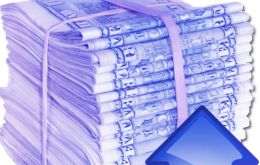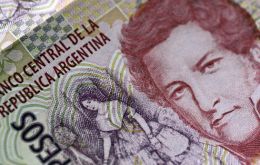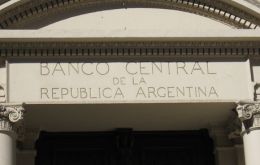MercoPress. South Atlantic News Agency
Tag: Argentine Central Bank
-
Thursday, March 27th 2014 - 08:02 UTC
Argentina issues 10bn Pesos in bonds to drain liquidity and contain inflation

Argentina's government will issue as much as 10 billion pesos (1.25 billion dollars) in bonds on Friday as it seeks funding from local investors and tries to drain liquidity from the local market as the harvest season approaches when traders begin selling the dollars of overseas shipments of grains and oilseeds.
-
Tuesday, March 11th 2014 - 06:44 UTC
Argentina with no serious economic problems, “just complexities and challenges”

Economy Minister Axel Kicillof argued that Argentina does not have serious economic problems, but rather “complexities, difficulties and challenges,” and accused economists and dissident media outlets of orchestrating a campaign to generate an “end of the world” feeling among members of society.
-
Friday, January 17th 2014 - 08:05 UTC
US dollar keeps breaking records in Argentina; central banks reserves fall a further 100 million

The US dollar reached a new record high on Thursday as purchase pressure on the so called “blue” or informal market continues pushing the price which closed 35 cents up at 11.50 pesos for buyers and 11.55 pesos for sellers.
-
Thursday, January 16th 2014 - 09:22 UTC
US dollar reaches new record in Argentina, 11.25 Pesos

The US dollar in Argentina continued to climb on Wednesday and reached new highs both in the official market and in parallel trading or the 'blue market'. The official rate closed at 6.75 Pesos to the greenback while the 'blue' reached a record 11.25 Pesos (selling price) with a 66.5% gap between both markets.
-
Saturday, December 14th 2013 - 06:11 UTC
Argentine central bank issues hard currency bonds hoping to lure cereal exporters

The Argentine Central Bank, starved of dollars and declining international reserves started to trade new short-term dollar-denominate bonds in order to encourage the farm sector to sell the crops they are still holding on to. It is estimated that over 3bn dollars in mainly soybeans remain in the hands of farmers and cereal exporters.
-
Monday, October 21st 2013 - 21:30 UTC
Argentine Central bank losing reserves at a rate of 47.5 million dollars per day

Argentina's central bank is currently losing international reserves at an average of 47,5 million dollars per day or 8 million per hour, according to the latest figures on the bank's accounts which is increasingly used by the government of President Cristina Fernandez to honor foreign debt and finance the budget.
-
Wednesday, August 28th 2013 - 01:07 UTC
Argentina's international reserves at a six year record low, and sliding ….

Argentina’s central bank international reserves pierced the psychological barrier of 37bn dollars and ended Tuesday at 36.9bn dollars, which is the lowest in over six years and will continue to drain since next month the country must repay in full 2bn of a 2007 sovereign bond.
-
Friday, August 16th 2013 - 03:37 UTC
Argentina will pay bonds maturing in September with Central bank reserves

Argentina's central bank approved on Thursday the use of 2.5 billion dollars to pay public debt through the rest of 2013, a move that will further diminish reserves already stretched by heavy state spending ahead of the October midterm election.
-
Thursday, August 8th 2013 - 03:05 UTC
Argentina central bank turned into state-financing tool: recession and higher inflation forecasted

Argentina is forecasted to fall into recession next year on the back of super-loose money policy with inflation reaching 24% this year and 30% in 2014 as the government continues to appeal to Central bank resources to meet budget commitments, according to London based Capital Economics.
-
Friday, July 12th 2013 - 08:13 UTC
Argentina: private estimates’ June inflation reached 1.93% and 23.78% in twelve months

Argentina’s June inflation according to the ‘congressional index’ was 1.93%, and 23.78% in the last twelve months, it was announced on Thursday by the opposition members from the Lower House Freedom of Speech committee.
